British prime minister Boris Johnson said on Tuesday he would not be introducing new COVID-19 restrictions in England before Christmas, but the situation remained extremely difficult and the government might need to act afterwards.
Britain has reported record levels of COVID-19 cases over the past week as the highly transmissible Omicron variant spreads, and hospitalisations are also rising.
It recorded 90,629 new daily COVID-19 cases on Tuesday.
Mr Johnson held a more than two-hour meeting with his cabinet to discuss the latest COVID-19 data on Monday. Media reported several ministers had pushed back against the prospect of new curbs before Christmas, despite warnings from some scientists.
"We don't think today that there is enough evidence to justify any tougher measures before Christmas," Mr Johnson said in a video posted on social media.
Uncertainty remained around how likely people were to need hospital treatment after being infected with Omicron compared to previous variants, as well as the impact of booster doses of vaccines which are being rolled out rapidly.
"We can't rule out any further measures after Christmas," Mr Johnson said. "We continue to monitor Omicron very closely and if the situation deteriorates we will be ready to take action if needed."
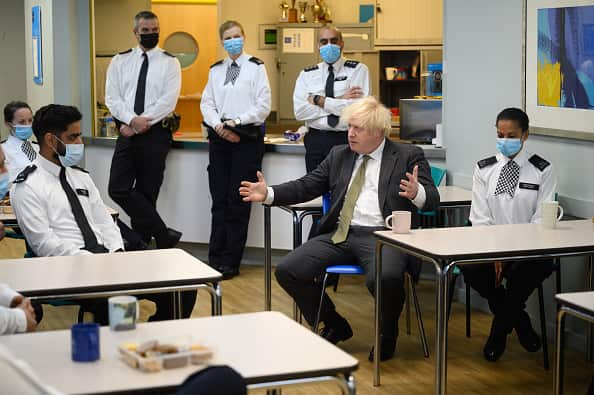
The idea of further restrictions is unpopular among Conservative politicians, with nearly 100 last week voting against the introduction of new COVID-19 rules, leaving Mr Johnson reliant on the support of the opposition Labour Party.
British media had previously reported that temporary curbs, lasting between two weeks and a month, were more likely to be introduced in England after Christmas. These could include a ban on households mixing indoors and limits on the numbers who can meet outdoors.
Earlier on Tuesday, Scottish first minister Nicola Sturgeon set out plans for post-Christmas restrictions on large-scale events in Scotland, including the cancellation of public New Year's Eve celebrations, as well as restricting bars and restaurants to table service.
Wales will introduce restrictions from 26 December which will include a ban on spectators at sporting events and a requirement to work from home.
Mr Johnson's announcement comes as other European nations have introduced, or are planning to implement, additional COVID restrictions:
Netherlands in snap lockdown
On Sunday, the Netherlands started a snap lockdown that, aimed at stemming an expected COVID-19 surge caused by the fast-spreading Omicron variant, has left people's Christmas plans in disarray.
Prime Minister Mark Rutte announced the shutdown on Saturday evening, ordering the closure of all but essential stores, as well as restaurants, hairdressers, gyms, museums and other public places from Sunday until at least 14 January.
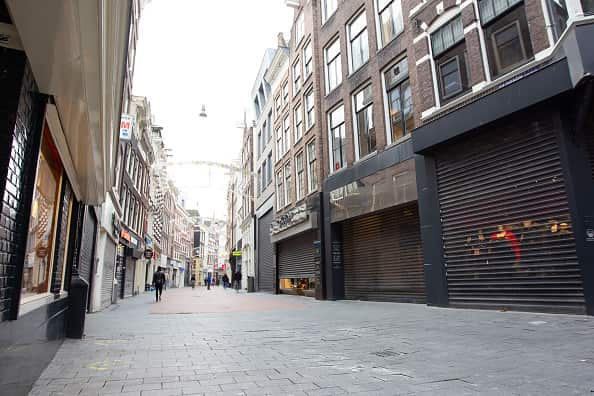
In Rotterdam, police used a water cannon to disperse a group of around 1,000 people who had gathered outside the city's main football stadium, ahead of a clash between local team Feyenoord and bitter rivals Ajax Amsterdam on Sunday.
Several people were held as fireworks and bottles were thrown at police and at the Ajax team bus, news agency ANP said.
Spectators have been barred from Dutch sporting events since the end of November.
The new curbs, which also include a ban on gatherings outside of more than two people, were unexpected, and many people rushed out on Saturday to stock up on presents or get a last-minute festive haircut.
Hospitality workers demanded compensation for lost income over the holiday season.
"Closing all bars and restaurants in such an important month is incredibly painful and dramatic. We need compensation and an exit strategy," the Dutch association for hospitality services said.
Dutch coronavirus infections have dropped from record levels after a night-time lockdown came into force last month. But Omicron cases are increasing rapidly and the variant is expected to become dominant before the end of the year.
Hospitals have already been cancelling regular operations for weeks as they try to avoid running out of beds due to high numbers of COVID-19 patients.
The government also said on Saturday that it would accelerate its booster vaccine program. More than 85 per cent of Dutch adults are double-vaccinated but fewer than nine per cent have had a booster shot, one of the lowest rates in western Europe.
Sweden tightens restrictions as cases rise
Sweden will urge all employees to work from home if possible and impose tighter rules for social distancing, the government said on Tuesday, as it ratchets up restrictions to fight a surge in new infections and the Omicron variant of the COVID-19 virus.
The number of new virus cases in Sweden, which sparked international attention last year for its rejection of hard lockdowns, have shot up in recent weeks after a calm autumn when most restrictions were phased out.
Hospitalisations and intensive care cases are still among the lowest per capita in Europe, but have also begun rising.
"The pace of new infections is rising fast and we are seeing more pressure on the healthcare system," Prime Minister Magdalena Andersson told a news conference. "The spread of the new virus variant - Omicron - is worrying."
Sweden saw 12,681 new cases and 11 deaths in the period from Saturday to Monday, the Public Health Agency said. It expects the pace of new infections to increase in the coming weeks, mainly due to the more easily-transmitted Omicron variant.
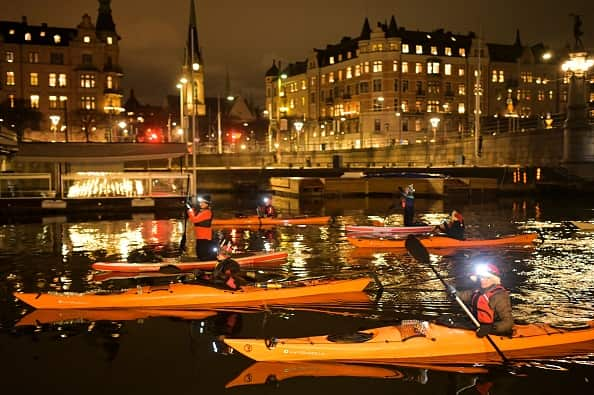
The peak, which is expected in mid-January, could be as high as 15,000 new cases per day if the Agency's worst-case scenario proves correct. That would be the highest daily number since the start of the pandemic in early 2020.
The latest restrictions - the second stage of the government's plans - includes a limit of 50 people at private gatherings and the need for a vaccination pass for public events where there are more than 500 people.
Bars and restaurants will only be able to serve seated guests while the public will also have to be seated at larger events - like football matches. Shops will have to limit the number of customers to prevent crowding.
Earlier this month, the government reintroduced some limited measures, such as the use of masks on public transport. It has warned that further measures may be needed if the situation deteriorates.
Portugal: 'This isn't the normal Christmas we are used to'
Portugal on Tuesday ordered nightclubs and bars to close and told people to work from home for at least two weeks starting on Saturday to control the spread of COVID-19 over the holiday period.
"This still isn't the normal Christmas we are used to," prime minister Antonio Costa told a news conference. "If we do not adopt these measures now, the consequences on everyone's lives will be much worse after Christmas and the New Year."
Mr Costa also announced capacity restrictions at stores and said a negative coronavirus test would now be required to stay at hotels or go to events.
Authorities will also limit outdoor gatherings to 10 people per group on New Year's Eve when a negative test will be needed to enter restaurants, casinos or attend parties in public spaces, Mr Costa said.
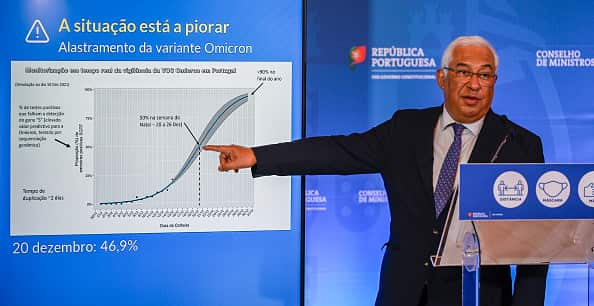
Most of the measures announced by Mr Costa were initially meant to come into force in early January but the current pandemic situation forced the government to implement them ahead of time, he added.
Portugal, which has one of the world's highest rates of vaccination against COVID-19 with around 87 per cent of its 10 million population fully inoculated, is facing a surge in infections along with the rest of Europe, in part due to the fast-spreading Omicron variant.
Close to 50 per cent of new coronavirus cases in Portugal are from the Omicron variant, the national health institute said in a report on Tuesday.
The country reported 5,754 new COVID-19 cases on Tuesday, returning to levels last seen in February, when it faced its toughest battle against the illness, but deaths and hospitalisations remain low compared to that period.
Finland's restaurants and bars to close early
Bars in Finland will be forced to close at 10pm on Christmas Eve as part of new restrictions designed to fight record Covid infection levels, the prime minister said on Tuesday.
Speaking after negotiations with her coalition partners, Sanna Marin laid out further controls on hospitality opening hours and alcohol sales for a three-week period starting 28 December.
Establishments whose main trade is serving alcohol will have to close at 6pm, while those whose main business is serving food will have to close at 8pm.
"We must take this situation seriously and react accordingly," Ms Marin said, on the day that health chiefs announced over 23,000 new coronavirus infections in the past two weeks, an all-time record in the Nordic nation of 5.5 million people.
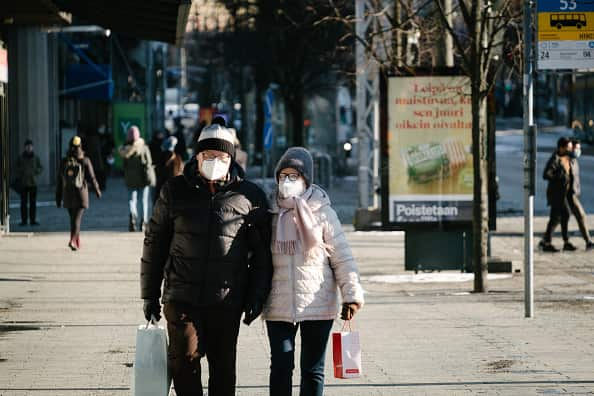
The government will begin preparing a support package to compensate hospitality businesses affected by the restrictions, Ms Marin said.
EU citizens arriving at the Finnish border will be required to show a negative COVID test under the new rules, while universities will be advised to move to distance teaching.
READ MORE
Despite record infection levels in recent weeks, Finland has maintained some of Europe's lowest incidence rates throughout the pandemic.
Health authorities have registered a total of 221,292 infections and 1,495 Covid-related deaths, equating to one of the lowest fatality rates on the continent.
Ireland rules out further restrictions before Christmas
Ireland's prime minister says there will be no further restrictions in the republic before Christmas, with the government wanting to assess the impact of current restrictions on the spread of Omicron.
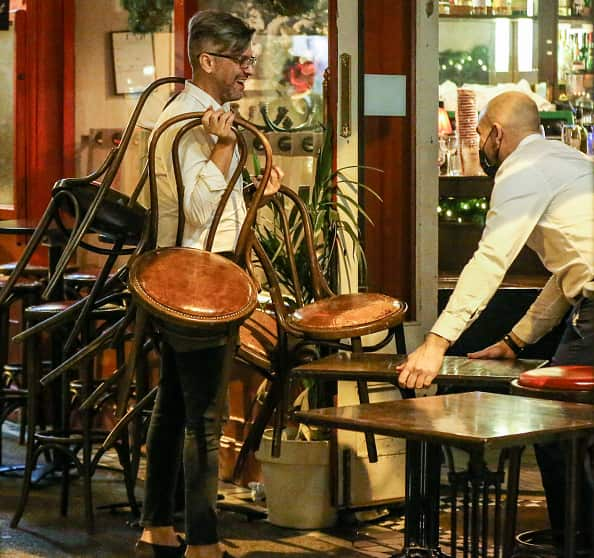
On 20 December, restrictions requiring restaurants and bars to close at 8pm came into effect, with the measure to last until at least 30 January.
The government has said it expects a surge of infections as Omicron takes over.
Ireland recorded 4,799 new cases of COVID-19 on Monday.
Ninety per cent of Irish adults have been vaccinated and around one-third of those have also received a booster dose.
The restrictions were introduced despite vocal opposition by the hospitality sector and a number of politicians in the parties of the ruling coalition, who said the move would encourage less-safe gatherings in private homes.
Under the new rules, indoor events should be limited to 50 per cent of venue capacity or 1,000 people, whichever is lower. Outdoor events should be 50 per cent capacity with no more than 5,000 people.
All people arriving into the country will be required to have either an antigen or PCR COVID-19 test, depending on whether they are vaccinated or not.

